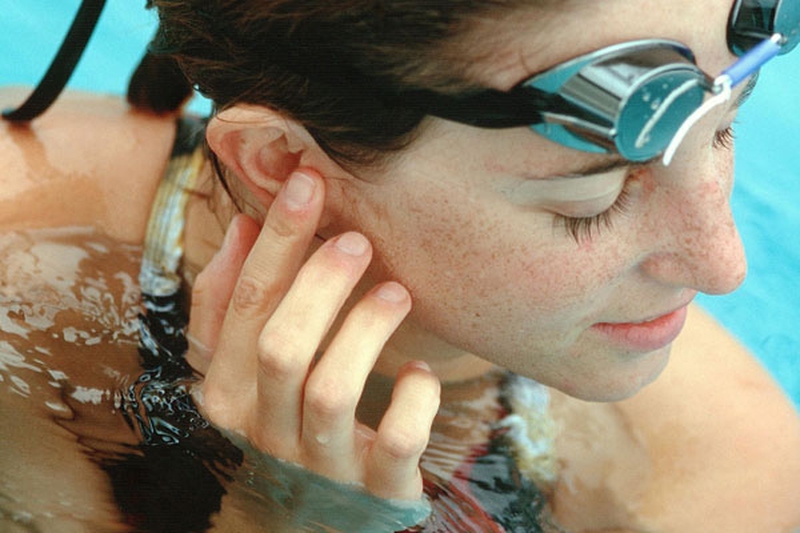Are you looking for a healthy and fun way to enjoy your time? Perhaps, you should consider swimming. Aside from being refreshing, swimming keeps you in shape like Michael Phelps or Hulk – in case you started swimming early. However, all good things come with a price and in the case of swimming; ear pain is the most common issue you will experience.

What Causes Ear Ache After Swimming?
There are two types of ear pain that happens after swimming, which could happen at the same time, especially when the ear area was infested with fungus or bacteria:
Inner ear pain
External ear pain or external otitis
Inner ear pain happens when the water from the swimming pool gets trapped inside the ear canal. You might be one of the many who would shake their head vigorously, hoping to get the water out of your ear. Sadly, the bacteria has trapped in a better place where it can grow and multiply; hence the ear pain.
Apart from being annoying and making you feel that you can’t hear clearly, inner ear pain can take long to get rid of. In fact, it would take several days before the water trapped inside your ear canal is completely drained.
On the other hand, you might experience external ear pain or more popularly known as “swimmer’s ear.” This happens when the skin of the ear canal is broken, thereby allowing bacteria to come in, stay longer, and multiply. Although earache after swimming could happen in swimming pools because of the chlorine content that helps develop bacteria faster, swimmer’s ear is more common when you swim in ponds, lake, river, or polluted bodies of water.
Apart from swimming, you can also experience external ear pain when you clean your ears with sharp objects such as hair clip. These sharp objects could cut the ear canal’s skin and lead bacteria to go in and stay longer.
How to Deal with Ear Ache After Swimming
Professional Treatment
Here’s the thing: achy ears after you swim, regardless of whether it involves your inner or external ear, is a sign that bacteria is trapped inside. This could potentially lead to infection, especially if you have the wrong treatment or did the wrong things against your ears. Therefore, it is imperative that you seek professional help to make sure you have the right medications – and prevent the condition from getting worse.
For starters, over-the-counter pain relievers can help to mage pain associated with earache after swimming. You might want to consider prescription painkillers in case of severe pain. The medication could provide relief after a day or two.
In case of infection, your doctor will prescribe eardrops with antibiotics to treat external otitis. Depending on your pain level, eardrops will be used in conjunction with the pain medication. The purpose of eardrops with antibiotics, which may also contain steroids, is to fight the infection and reduce any swelling inside your ear canal. Make sure to use the drops continuously for 7 to 10 days to make sure that the bacteria are gone for good.
What if the swelling of your ear canal makes it impossible for the eardrops with antibiotics to do its job? In that case, your doctor will perform a procedure by inserting a wick into your ear canal. This will make it easier to transfer the medicine inside your ear and at the same time, remove the pus and debris using a gentle suction. In doing so, this will make it easier for the eardrops to work.
In severe cases of external ear pain, your doctor may prescribe oral antibiotics for treatment.
Home Remedies
Let’s say you are not a believer of medications and prefer to treat earache after swimming at home. While this may sound convenient, it is strongly recommended that you see a doctor first, then follow it up with home treatment. Otherwise, infection inside your ear might get worse and spread – and you surely don’t want that to happen.
After your doctor’s appointment, make sure you also do the following at home:
Follow the instructions given to you by your doctor when it comes to taking antibiotics or using eardrops. This will speed up your healing process and stop the infection from further multiplying.
Apply a warm cloth or heating pad on your affected ear to ease the pain. The heat could help melt the earwax and alleviate your condition.
Take ibuprofen or acetaminophen to help ease any discomfort associated with ear pain.
Avoid scratching the inside of your ear, especially with your hands. This could aggravate irritation, transfer more bacteria inside your ear, and make the condition worse.
Consider rinsing your ears using the mixture of 50 percent rubbing alcohol and 25 percent each of distilled water and white vinegar. Use a bulb syringe and the flushing solution must be similar to your body temperature.
Place a cotton ball or earplug while taking a bath. It is important that you keep your ears dry at all times while under treatment and a cotton ball or ear plug could protect your ear against water.
Do not use ear candles or hearing aids until your ear has fully recovered. Placing foreign objects in your ears might cause serious injury and prolong the healing process.
In conclusion, don’t prolong getting a treatment for earache after swimming. It seems convenient to let it pass, but there is a possibility that you are doing more harm than good to your ears. Get treatment as soon as possible and you will surely say goodbye to ear pain and discomfort in no time.
View All Comments /Add Comment